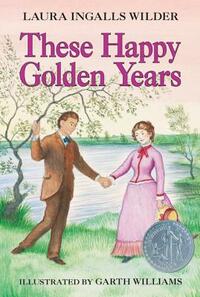Take a photo of a barcode or cover
This is what I've always regarded as the final book in the Little House series, though [a:Laura Ingalls Wilder|5300|Laura Ingalls Wilder|https://d202m5krfqbpi5.cloudfront.net/authors/1347574987p2/5300.jpg] continued to write about her life, as well as other topics; and of course there is no dearth of books about Laura. I've enjoyed reading these books to the kids as bedtime stories.
[b:These Happy Golden Years|77770|These Happy Golden Years (Little House #8)|Laura Ingalls Wilder|https://d202m5krfqbpi5.cloudfront.net/books/1348250247s/77770.jpg|4132] is different in some ways from the previous books. There is a continual bittersweetness as Laura grows up and life changes. It's not just that Laura is becoming an adult, but the Ingalls' life as a family has changed so much since the earlier books. They are now well settled near a town, and they have access to material goods and even some luxuries that would have been unimaginable for them in the Big Woods or Indian Territory. This book plays on the reader's emotions, those yearnings for the more rugged and in some ways simpler life of earlier times.Time passes much more rapidly in this book than in previous volumes, and even Christmases, which have always been highlights of the other books, come and go, sometimes with no mention. In writing this series, I believe Laura did an excellent job of capturing the shift in time perception as we grow into adulthood.
The highlight of These Happy Golden Years is, of course, the culmination of the courtship of Almanzo and Laura. It's sentimental and romantic and wonderful. And Almanzo is cool--cool enough that the story held the attention of the three boys I was reading it to. The Little House series is absolutely classic, and an indispensable part of American literature.
The romance with Almanzo is so natural and subtle--had forgotten how all of that plays out.
But again with the preachiness. These books just aren't holding up well for me.


